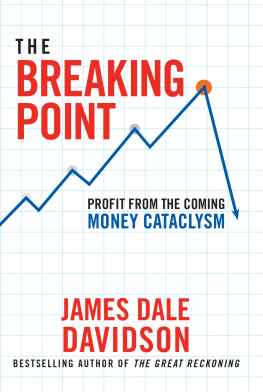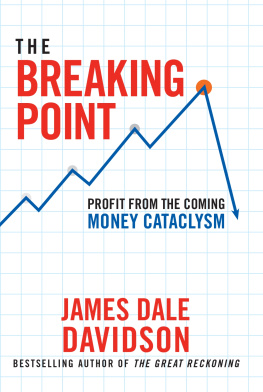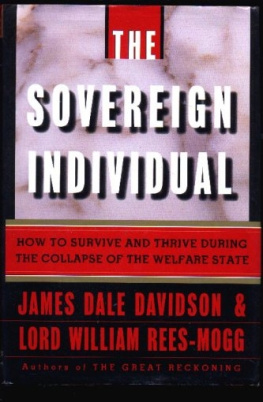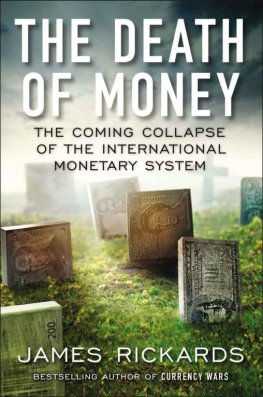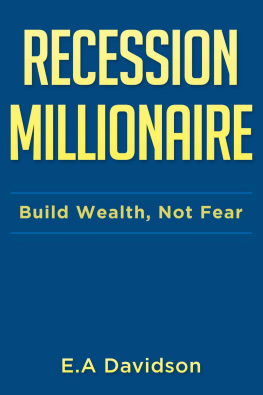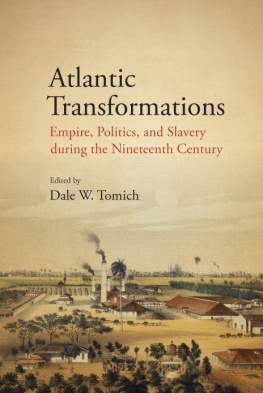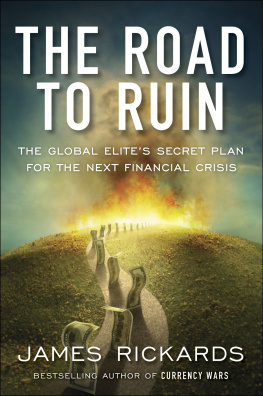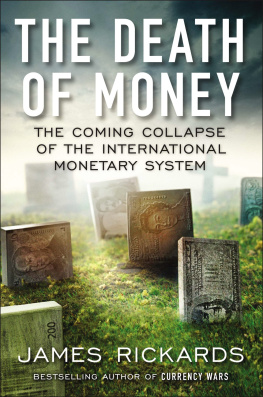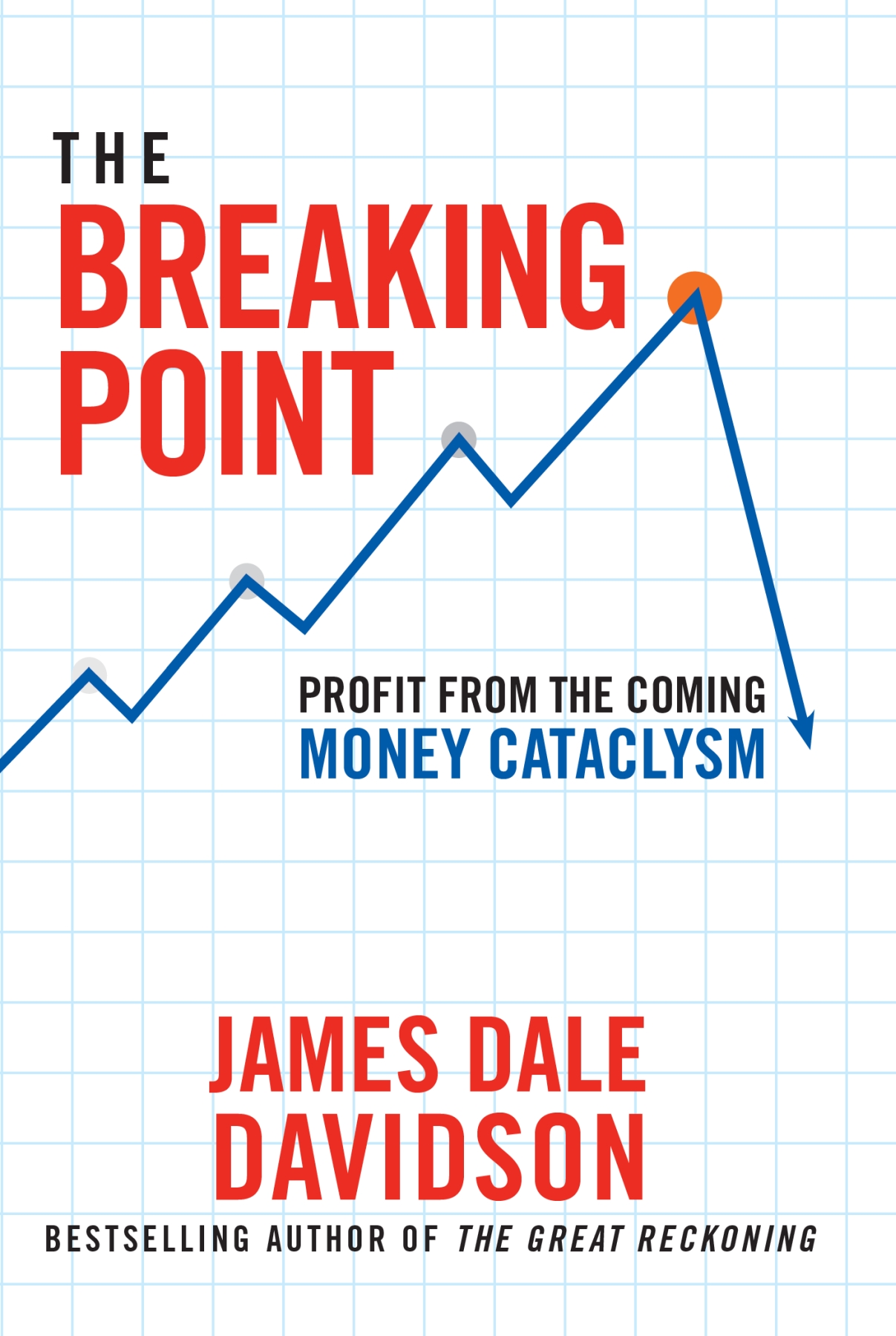
THE BREAKING POINT
Profit from the Coming Money Cataclysm
JAMES DALE DAVIDSON

Humanix Books
The Breaking Point
Copyright 2017 by Humanix Books
All rights reserved
Humanix Books, P.O. Box 20989, West Palm Beach, FL 33416, USA
Library of Congress Cataloging-in-Publication Data is available from the Library of Congress.
No part of this book may be reproduced or transmitted in any form or by any means, electronic or mechanical, including photocopying, recording, or by any other information storage and retrieval system, without written permission from the publisher.
Interior Design: Scribe Inc.
Humanix Books is a division of Humanix Publishing, LLC. Its trademark, consisting of the words Humanix is registered in the Patent and Trademark Office and in other countries.
Disclaimer: The information presented in this book is meant to be used for general resource purposes only; it is not intended as specific financial advice for any individual and should not substitute financial advice from a finance professional.
ISBN: 978-1-63006-060-2 (Hardcover)
ISBN: 978-1-63006-061-9 (E-book)
To my indispensable Sabine, who proves again, as e.e. cummings wrote, that unless you love someone, nothing else makes sense
Contents
By Bill Bonner
Something went wrong on the way to tomorrow. From the turn of the century in 1900 through the end of Cold War in 1989 to the next turn of the century in 2000, almost every view of the future looked as though it had been photoshopped. Imperfections were few.
In 1900, a survey was done. What do you see coming? asked the pollsters.
All those questions forecast better times ahead. Machines were just making their debut, but already people saw their potential. You can see some of that optimism on display in the Paris metro today. In the Montparnasse station is an illustration from the 1800s of what the artist imagined for the next century. It is a fantastic vision of flying vehicles, elevated sidewalks, and incredible mechanical devices.
But when asked what lay ahead, the most remarkable opinion, at least from our point of view, was that government would decline. Almost everyone thought so. Why would that happen? We wouldnt need so much government, they said. People will all be rich. Wealthy people may engage in fraud and finagling, but they dont wait in dark allies to bop people over the head and steal their wallets. And they dont need government pensions or government health care either.
Nor do they attack their neighbors. Norman Angell wrote a best-selling book, The Great Illusion, in which he explained why. Wealth is no longer based on land, he argued. Instead, it depends on factories, finance, commerce, and delicate relationships between suppliers, manufacturers, and consumers. As capitalism makes people better off, he said, they wont want to do anything to interfere with it. If you disrupt them, you only make yourself poorer, he pointed out.
One of his most important readers was Viscount Escher of Englands War Committee. He told listeners that new economic factors clearly prove the inanity of aggressive wars.
Capitalism flourishes in times of peace, sound money, respect for property rights, and free trade. One of the most important components of the wealth of the late nineteenth century was international commerce. It was clear that everyone benefitted from globalized trade. Who would want to upset that apple cart?
War must soon be a thing of the past, said Escher.
But in August 1914, the cart fell over anyway. The Great War began five years after Angells book hit the best-seller lists. On the first day of the Battle of the Somme aloneone hundred years agothere were more than 70,000 casualties. And when Americans arrived in 1917, the average soldier arriving at the front lines had a life expectancy of only twenty-one days. By the time of the Armistice on the eleventh day of the eleventh month at 11 a.m. of 1918, the war had killed 17 million people, wounded another 20 million, and knocked off the major ruling families of Europethe Hohenzollerns, the Hapsburgs, and the Romanoffs (the Bourbons and Bonapartes were already gone from France).
Hic hoc. Stuff happens.
James Dale Davidsons new book, The Breaking Point, is an attempt to explain why stuff happens the way it does. Using his theory of megapolitics, he also takes some guesses about what happens next.
After WWI came a thirty-year spell of trouble. In keeping with the metaphor of the Machine Age, the disintegration of prewar institutions broke the tie rods that connected civilized economies to their governments. Reparations imposed on Germany caused hyperinflation in Germany, while America enjoyed a Roaring 20s as Europeans paid their debtsin goldto US lenders. But that joyride came to an end in 29... and then the feds flooded the carburetor with disastrously maladroit efforts to get the motor started again, including the Smoot-Hawley Act, which restricted cross-border trade. The ismsfascism, communism, syndicalism, socialism, anarchismoffered solutions. Then finally, the brittle rubber of communism (aided by modern democratic capitalism) met the mean streets of fascism, in another huge bout of government-led violenceWWII.
By the end of this period, the West had had enough. Europe settled down with bourgeois governments of various social-democrat forms. America went back to business, with order books filled and its factories still intact. The isms held firm in the Soviet Union and moved to the Orient, with further wear and tear on the machinery of warfare in Koreaand later Vietnam.
Finally in 1979, Deng Tsaoping announced that while the ruling Communist Party would stay in control of China, the country would abandon its MarxistLeninistMaoist creed. China joined the world economy with its own version of state-guided capitalism. Then, ten years later, the Soviet Union gave up even more completelyrejecting both the Communist Party and communism itself.
This was the event hailed in a silly essay by Francis Fukuyama, The End of History? The battle was finally won, he suggested. It is the endpoint of mankinds ideological evolution and the universalization of western liberal democracy as the final form of human government, he wrote. With the Cold War over, modern democratic capitalism would be perfected. And now US companies could hustle their products to 1.5 billion more consumers.
But the most obvious and immediate benefit America was to get a peace dividend, as billions of dollars could now be liberated from the defense budget and put to better use elsewhere.
Things were looking up. As China and the Soviet Union went, so went the rest of the worldwith everyone trying to learn the latest buzz words from globalized business schools, setting up factories to make things for people who really couldnt afford them, gambling on Third World debt, trading stocks of companies that used to belong to the government, and aiming to get their sons and daughters into Harvard so they would be first in line for a job at Goldman Sachs.
But wait. Things got even better when, in the late 90s, it looked like the Information Age had freed us from the constraints of the Machine Age. Two things held back growth rates, or so it was said at the time: ignorance and resources. You needed educated scientists and trained engineers to design and build a railroad. You also needed material inputsiron ore, copper tin, and most important, energy.
Next page
